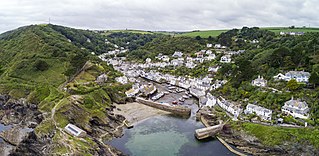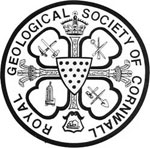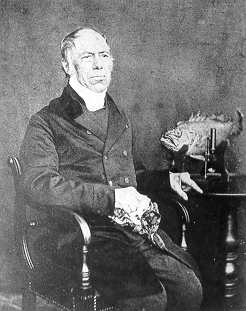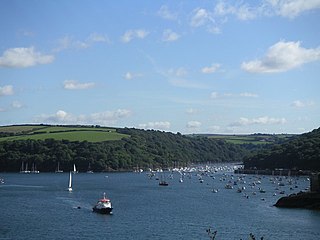
Sir Arthur Thomas Quiller-Couch was a British writer who published using the pseudonym Q. Although a prolific novelist, he is remembered mainly for the monumental publication The Oxford Book of English Verse 1250–1900 and for his literary criticism. He influenced many who never met him, including American writer Helene Hanff, author of 84, Charing Cross Road and its sequel, Q's Legacy. His Oxford Book of English Verse was a favourite of John Mortimer's fictional character Horace Rumpole.

Fowey is a port town and civil parish at the mouth of the River Fowey in south Cornwall, England, United Kingdom. The town has been in existence since well before the Norman invasion, with the local church first established some time in the 7th century; the estuary of the River Fowey forms a natural harbour which enabled the town to become an important trading centre. Privateers also made use of the sheltered harbourage. The Lostwithiel and Fowey Railway brought China clay here for export.

Polperro is a large village, civil parish, and fishing harbour within the Polperro Heritage Coastline in south Cornwall, England. Its population is around 1,554.

St Columb Major is a town and civil parish in Cornwall, England, United Kingdom. Often referred to locally as St Columb, it is approximately seven miles (11 km) southwest of Wadebridge and six miles (10 km) east of Newquay The designation Major distinguishes it from the nearby settlement and parish of St Columb Minor on the coast. An electoral ward simply named St Columb exists with a population at the 2011 census of 5,050. The town is named after the 6th-century AD Saint Columba of Cornwall, also known as Columb.

Sport in Cornwall includes two sports not found elsewhere in the world, except in areas influenced by Cornish culture i.e. the Cornish forms of wrestling and hurling. The sports otherwise most closely associated with Cornwall are rugby union football and surfing.
Troy class boats are a class of sailing boats unique to Fowey in Cornwall and are raced competitively.

Bodinnick is a riverside village in south-east Cornwall, in the United Kingdom. According to the Post Office the population of the 2011 Census was included in the civil parish of Lanteglos-by-Fowey. It is a fishing village situated on the east bank of the River Fowey opposite the town of Fowey, also on the banks of the Fowey River. The ferry crossing is from Fowey to Bodinnick and the "Old Ferry Inn" is located on its bank glorified as "in the heart of Du Maurier country". This ferry terminal is said to have existed since the 13th century.

The Royal Geological Society of Cornwall is a geological society originally based in Penzance, Cornwall in the United Kingdom. It was founded in 1814 to promote the study of the geology of Cornwall, and is the second oldest geological society in the world, after the Geological Society of London which was founded in 1807.
Richard Quiller Couch,, British naturalist, eldest son of Jonathan Couch, was born at Polperro, Cornwall, UK on 14 March 1816. After receiving a medical education under his father and at Guy's Hospital, London, where he gained several honours and prizes and obtained the ordinary medical qualifications, he returned to Polperro to assist his father, and employed his leisure in careful zoological study.

Jonathan Couch was a British naturalist, the only child of Richard and Philippa Couch, of a family long resident at Polperro, a small fishing village between Looe and Fowey, on the south coast of Cornwall. A blue plaque on the wall of Warren cottage commemorates his birthplace.

Castle Dor is a 1961 historical novel by Daphne du Maurier, set in 19th century Cornwall.

HMS Primrose was a Royal Navy Cruizer-class brig-sloop built by Thomas Nickells, at Fowey and launched in 1807.
Dufflin is an old variety of cider apple from the County of Cornwall, England. It was included in orchard trials by Long Ashton Research Station in 1957.
Major Bevil Bryan Quiller-Couch MC was a decorated British Army officer who served continuously in Flanders and France from August 1914 to 1918. He was the son of the Cornish writer, Sir Arthur Quiller-Couch of Fowey, Cornwall. He was engaged to the war poet, May Wedderburn Cannan, but he died before they could be married. A book of his letters was published in 2002. The book was also made into a radio play by the BBC.















